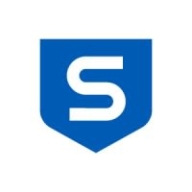


Sophos Cyberoam UTM and Check Point NGFW vie in the cybersecurity market. Based on the data, Check Point NGFW has an upper hand due to its comprehensive security features and robust centralized management, though it comes at a higher price.
Features: Sophos Cyberoam UTM provides identity-based policy creation, application filtering, and web filtering with Layer 8 technology for user-level policies. Check Point NGFW offers threat prevention, intrusion detection, and application control, all managed through a unified SmartDashboard.
Room for Improvement: Sophos Cyberoam UTM could enhance scalability and ease of VPN configuration while addressing UI and policy management issues. Check Point NGFW's cloud management integration and policy simplification could be improved, with better logging capabilities needed.
Ease of Deployment and Customer Service: Sophos Cyberoam UTM generally deploys smoothly in hybrid environments, albeit with inconsistent support experiences. Check Point NGFW is noted for initial setup complexity, yet offers reliable support needing better communication.
Pricing and ROI: Sophos Cyberoam UTM is cost-effective for SMEs, offering good security value. Check Point NGFW, while pricier, provides a premium solution with positive ROI due to its comprehensive security, although cost may be high for smaller firms.
Clients are now comfortable and not wasting productive hours on IT support.
We have experienced a positive return on investment by utilizing Fortinet's products.
There's definitely an ROI. Having a centralized way of managing and applying policies across the entire organization always helps.
This is a time-saving measure because we don't need to deploy a cluster or a firewall each time; we just create a virtual system on the management server using the same appliance.
He explained that it required a command line configuration, as it couldn't be done through the graphical user interface.
I would rate their support for FortiGate a nine out of ten.
They offer very accurate solutions.
The support team we engaged was knowledgeable and well-versed with the application.
We have escalated issues to Check Point technical support multiple times and have received timely and very good responses.
Even challenging issues like those with VPNs have been resolved efficiently with their help.
They resolve issues timely once connected.
They scale up really well from smaller models like the FortiGate 40 and 50 to bigger sites with the FortiGate 100 for more throughput - up to enterprise datacenters.
The variation comes in terms of the interfaces and throughputs, but from a security perspective, you get the same benefit, irrespective of whether you have an entry-level unit or an enterprise.
There are many options available, and we can choose the size of the box based on our requirements.
If specified correctly, even the smaller boxes offer high session and bandwidth rates, making the solution highly scalable, even up to telco-level requirements.
Scalability must be carefully planned for, considering future growth and user base increases.
They offer multiple solutions from SMBs to enterprise data centers, making it an easily scalable solution with no issues in scalability.
There are no bugs or glitches, and it doesn't crash or freeze.
Improper handling of these can lead to a memory surge, a well-known bug that can cause the entire system to freeze.
It is less stable than Palo Alto Networks and Check Point firewalls because there are lots of bugs in the latest firmware.
While the solution is generally stable, there are complications, such as requiring SmartConsole for deployment and upgrades, which can be time-consuming.
I have worked with Check Point products for 15 years and haven't found any stability or performance issues.
I have encountered stability issues primarily with VPN, which required a code upgrade.
If I have put 10 GBPS of throughput on a firewall and I enable all of these features available, such as IPS or UTM functionalities, the throughput comes down to 1 GBPS.
By providing an integrated solution, users would have access to all features and functionalities within a single window, eliminating the need to navigate through multiple windows.
Investing in a solution that can accommodate such growth would be more cost-effective than repeatedly purchasing new hardware.
Other products, like FortiGate, are perceived as more intuitive because they are easier to configure from the start.
Check Point would benefit from having a single console for both basic and policy configurations.
The graphical user interface (GUI) could benefit from some updates.
It would be beneficial if phone calls or SMS for two-factor authentication were available.
Secure SD-WAN is free of charge.
The most expensive part is the renewal of the license subscription.
FortiGate is priced lower than Palo Alto.
In comparison to Fortinet and other products, the pricing may be considered high.
Compared to other solutions, the pricing of Check Point NGFW is high.
The perception is that Check Point NGFW is expensive, especially when all software modules are included.
It's easy to monitor the end-to-end network through the firewall.
The firewall, IPS, and VPN functions are the most valuable features.
FortiGate provides solid protection against viruses, malware, and other threats.
The firewall's default behavior of blocking all traffic, including a cleanup rule that blocks everything from external to internal sources, is highly valuable for protecting our network.
The most valuable features in my experience include perimeter firewalling, cloud and mobile security, application control, URL filtering, DLP, threat prevention, intrusion protection, and safeguarding against malware, botnets, and zero-day attacks.
In the normal GA login, I can create interfaces and configure interface IPs, while in the SmartConsole, I manage the NAT quality and firewall access.
It provides bandwidth management, category management of websites, blocking certain elements, IPS blocking, DDoS protection, and VPN management between sites and clients.



Fortinet FortiGate offers comprehensive network security and firewall protection across multiple locations. It effectively manages data traffic and secures environments with features like VPN, intrusion prevention, and UTM controls.
Organizations rely on Fortinet FortiGate for its robust integration with advanced security policies, ensuring significant protection for enterprises, cloud environments, and educational sectors. It facilitates network segmentation, application-level security, and authentication management, securing communication within and between locations such as branches and data centers. Its efficient SD-WAN and UTM features enable streamlined data management and enhanced threat protection capabilities. Users appreciate its centralized management, facilitating seamless operations across diverse environments.
What are the key features of Fortinet FortiGate?
What benefits should users expect from Fortinet FortiGate?
Fortinet FortiGate is crucial in sectors like education, offering robust networks for secure data flow between campuses and facilitating remote learning. In enterprise environments, it allows efficient management of application traffic and security across multiple branches, while in the cloud, it seamlessly integrates with diverse platforms to enhance security infrastructure.
Check Point NGFW provides comprehensive firewall protection, managing VPNs, and securing network perimeters with advanced threat prevention techniques. It's widely used to protect businesses, data centers, and ensure secure traffic management.
Check Point NGFW offers robust security for companies, delivering security features like threat prevention, URL filtering, and intrusion prevention across both layer 3 and layer 7. It supports remote access, web filtering, application control, and safeguards against malware, botnets, and zero-day attacks. With its intuitive management console, deep packet inspection, centralized management capabilities, and sophisticated threat detection, Check Point NGFW enhances network security and productivity. The system integrates seamlessly with other technologies and provides real-time monitoring, detailed reporting, and automated policy management. Additionally, its setup is straightforward, it scales well, and offers comprehensive logging.
What are the key features?Check Point NGFW is implemented in industries like finance, healthcare, and retail, where protecting sensitive data and ensuring compliance are critical. Its advanced security features and ease of management make it suitable for large enterprises and data centers, ensuring reliable and secure network operations.
We monitor all Unified Threat Management (UTM) reviews to prevent fraudulent reviews and keep review quality high. We do not post reviews by company employees or direct competitors. We validate each review for authenticity via cross-reference with LinkedIn, and personal follow-up with the reviewer when necessary.